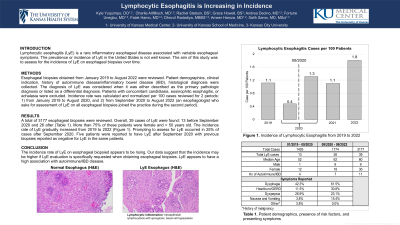Monday Poster Session
Category: Esophagus
P1817 - Lymphocytic Esophagitis Is Increasing in Incidence
Monday, October 23, 2023
10:30 AM - 4:15 PM PT
Location: Exhibit Hall

Has Audio
- KY
Kyle Yuquimpo, DO
University of Kansas Medical Center
Kansas City, KS
Presenting Author(s)
Kyle Yuquimpo, DO1, Charlie Altfillisch, MD1, Rachel Stetson, BS2, Grace Howell, BS3, Andrea Decino, MD1, Fortune Unegbu, MD1, Falak Hamo, MD1, Dhruvil Radadiya, MBBS1, Ameer Hamza, MD1, Salih Samo, MD, MSc1
1University of Kansas Medical Center, Kansas City, KS; 2University of Kansas School of Medicine, Kansas City, KS; 3Kansas City University, Kansas City, MO
Introduction: Lymphocytic esophagitis (LyE) is a rare inflammatory esophageal disease associated with variable esophageal symptoms. The prevalence or incidence of LyE in the United States is not well known. The aim of this study was to assess for the incidence of LyE on esophageal biopsies over time.
Methods: Esophageal biopsies obtained from January 2019 to August 2022 were reviewed. Patient demographics, clinical indication, history of autoimmune disease or inflammatory bowel disease (IBD), histological diagnosis were collected. The diagnosis of LyE was considered when it was either described as the primary pathologic diagnosis or listed as a differential diagnosis. Patients with concomitant candidiasis, eosinophilic esophagitis, or achalasia were excluded. Incidence rate was calculated and normalized per 100 cases reviewed for 2 periods: 1) from January 2019 to August 2020, and 2) from September 2020 to August 2022 (an esophagologist who asks for assessment of LyE on all esophageal biopsies joined the practice during the second period).
Results: A total of 3177 esophageal biopsies were reviewed. Overall, 39 cases of LyE were found: 13 before September 2020 and 26 after (Table 1). More than 75% of these patients were female and >50 years old and the incidence rate of LyE gradually increased from 2019 to 2022 (Figure 1). Prompting to rule out LyE occurred in 25% of cases after September 2020. Five patients were reported to have LyE after September 2020 with previous biopsies reported as negative for LyE.
Discussion: The incidence rate of LyE on esophageal biopsied appears to be rising. Our data suggest that the incidence may be higher if LyE evaluation is specifically requested when obtaining esophageal biopsies. LyE appears to have a high association with autoimmune/IBD disease.

Disclosures:
Kyle Yuquimpo, DO1, Charlie Altfillisch, MD1, Rachel Stetson, BS2, Grace Howell, BS3, Andrea Decino, MD1, Fortune Unegbu, MD1, Falak Hamo, MD1, Dhruvil Radadiya, MBBS1, Ameer Hamza, MD1, Salih Samo, MD, MSc1. P1817 - Lymphocytic Esophagitis Is Increasing in Incidence, ACG 2023 Annual Scientific Meeting Abstracts. Vancouver, BC, Canada: American College of Gastroenterology.
1University of Kansas Medical Center, Kansas City, KS; 2University of Kansas School of Medicine, Kansas City, KS; 3Kansas City University, Kansas City, MO
Introduction: Lymphocytic esophagitis (LyE) is a rare inflammatory esophageal disease associated with variable esophageal symptoms. The prevalence or incidence of LyE in the United States is not well known. The aim of this study was to assess for the incidence of LyE on esophageal biopsies over time.
Methods: Esophageal biopsies obtained from January 2019 to August 2022 were reviewed. Patient demographics, clinical indication, history of autoimmune disease or inflammatory bowel disease (IBD), histological diagnosis were collected. The diagnosis of LyE was considered when it was either described as the primary pathologic diagnosis or listed as a differential diagnosis. Patients with concomitant candidiasis, eosinophilic esophagitis, or achalasia were excluded. Incidence rate was calculated and normalized per 100 cases reviewed for 2 periods: 1) from January 2019 to August 2020, and 2) from September 2020 to August 2022 (an esophagologist who asks for assessment of LyE on all esophageal biopsies joined the practice during the second period).
Results: A total of 3177 esophageal biopsies were reviewed. Overall, 39 cases of LyE were found: 13 before September 2020 and 26 after (Table 1). More than 75% of these patients were female and >50 years old and the incidence rate of LyE gradually increased from 2019 to 2022 (Figure 1). Prompting to rule out LyE occurred in 25% of cases after September 2020. Five patients were reported to have LyE after September 2020 with previous biopsies reported as negative for LyE.
Discussion: The incidence rate of LyE on esophageal biopsied appears to be rising. Our data suggest that the incidence may be higher if LyE evaluation is specifically requested when obtaining esophageal biopsies. LyE appears to have a high association with autoimmune/IBD disease.

Figure: Incidence rate of lymphocytic esophagitis per 100 cases from 2019 to 2022. September 2020 indicates start of esophagologist to practice.
Disclosures:
Kyle Yuquimpo indicated no relevant financial relationships.
Charlie Altfillisch indicated no relevant financial relationships.
Rachel Stetson indicated no relevant financial relationships.
Grace Howell indicated no relevant financial relationships.
Andrea Decino indicated no relevant financial relationships.
Fortune Unegbu indicated no relevant financial relationships.
Falak Hamo indicated no relevant financial relationships.
Dhruvil Radadiya indicated no relevant financial relationships.
Ameer Hamza indicated no relevant financial relationships.
Salih Samo: Castle Biosciences – Advisory Committee/Board Member, Speakers Bureau.
Kyle Yuquimpo, DO1, Charlie Altfillisch, MD1, Rachel Stetson, BS2, Grace Howell, BS3, Andrea Decino, MD1, Fortune Unegbu, MD1, Falak Hamo, MD1, Dhruvil Radadiya, MBBS1, Ameer Hamza, MD1, Salih Samo, MD, MSc1. P1817 - Lymphocytic Esophagitis Is Increasing in Incidence, ACG 2023 Annual Scientific Meeting Abstracts. Vancouver, BC, Canada: American College of Gastroenterology.
